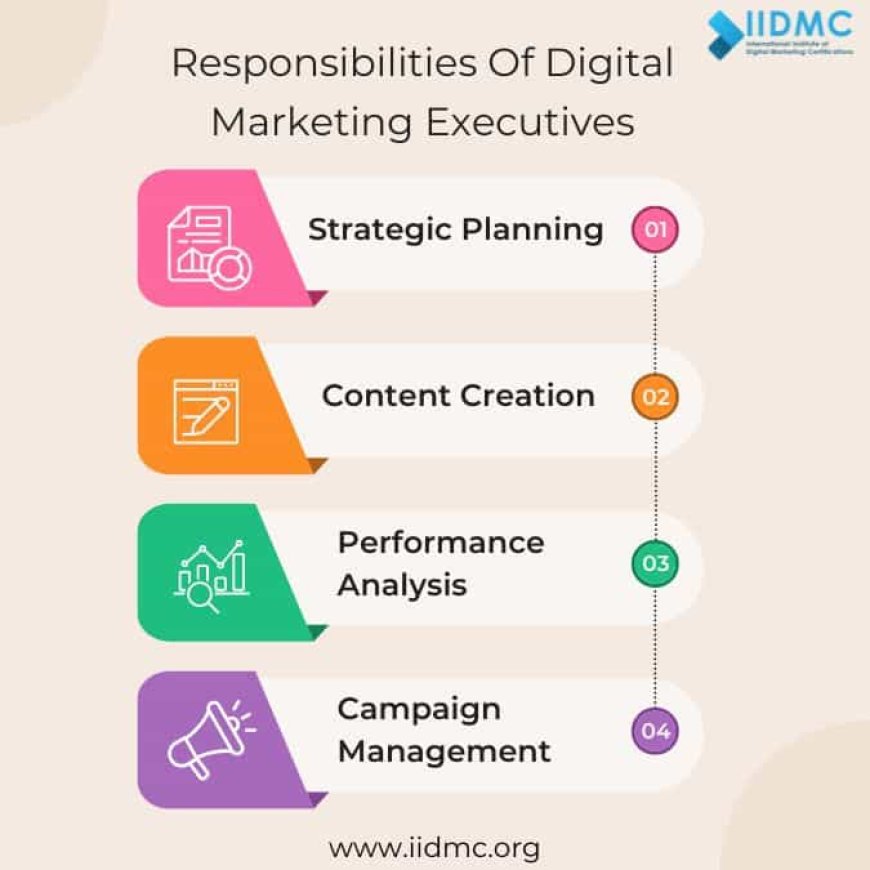Digital Marketing Executive Job Secrets Revealed
Learn insider tips and crucial skills for success as a Digital Marketing Executive. Explore career advancement opportunities and gain valuable insights into the digital marketing job market.

Digital marketing has become an essential component of current corporate tactics, and a Digital Marketing Executive is at the centre of this digital revolution. A Digital Marketing Executive job is responsible for everything from managing social media networks to reviewing campaign performance. This article delves into the keys to succeeding in this dynamic and lucrative professional path.
In changing world of digital marketing, the function of a Digital Marketing Executive Job is both enigmatic and critical. Behind the glossy exteriors of successful advertisements and bursting social media activity lurks a world of distinct strategies and hidden problems. These are the secrets that power the digital marketplace, known only to those who choreograph these complicated online ballets.
Today, we're revealing the true requirements for becoming a Digital Marketing Executive. This blog delves deeply into the core of digital marketing expertise, from little-known strategies that produce tremendous interaction to personal abilities that aren't stated in any job description. Whether you want to work in digital marketing or are simply interested in how it works, get ready to learn the vital secrets that can launch your career to new heights.
Key Responsibilities of a Digital Marketing Executive
1. Managing Social Media channels:
A Digital Marketing Executive's key tasks involve managing the company's presence on many social media sites. To increase brand exposure and engagement, you must create great content, schedule articles, and connect with your audience.
2. Creating and Implementing Digital Marketing Campaigns:
Digital Marketing Executives are responsible for creating and implementing digital marketing initiatives across several channels, including email, social media, and search engines. They use their creativity and smart thinking to create campaigns that appeal to the target demographic and meet commercial objectives.
3. Analyzing Campaign Performance:
Analyzing the efficacy of digital marketing campaigns is critical for improving tactics and increasing ROI. Digital Marketing Executives use a variety of analytics tools to monitor critical metrics like website traffic, conversion rates, and engagement levels, allowing them to make data-driven decisions.
4. Strategic Planning:
Successful digital ads require meticulous planning. To meet business objectives, digital marketing executives must do market research, identify target demographics, and develop specialized strategies.
5. Content Creation and Optimization:
Effective digital marketing relies heavily on compelling content. Executives must generate compelling language, images, and multimedia material that is optimized for search engines and user experience.
6. Performance Analysis:
Data-driven decision-making is an essential component of modern marketing. Executives use key performance indicators (KPIs) including website traffic, conversion rates, and social media engagement to evaluate campaign efficacy and adjust plans accordingly.
7. Campaign Management:
Digital Marketing Executives manage a wide range of marketing initiatives across several platforms, including email marketing, social media marketing, search engine optimization (SEO), and pay-per-click (PPC) campaigns.

Challenges Faced by Digital Marketing Executives
Keeping up with rapid changes.
The digital marketing world is defined by quick changes and growing technologies, making it difficult for Digital Marketing Executives to keep up with the newest trends and best practices.
Handling several projects.
Digital Marketing Executives frequently work on many projects at once, ranging from managing social media campaigns to launching new marketing initiatives. To achieve project success, jobs must be prioritized and time managed effectively.
What qualifications do I need to become a Digital Marketing Executive?
To become a Digital Marketing Executive, you typically need a combination of formal education, relevant skills, and practical experience. Here’s a detailed breakdown:
1. Educational Background:
-
Bachelor’s Degree: A bachelor's degree can often be a minimum requirement. Marketing, business, communications, and other related fields are all relevant. Some professions may also consider degrees in graphic design, information technology, or data analytics, depending on the unique role's requirements.
-
Certifications: Certifications can help you build your résumé and highlight specialized skills. Popular certifications include Google Analytics, Google Ads, HubSpot Content Marketing, and Facebook Blueprint. These credentials demonstrate competency in important digital marketing technologies and methods.
2. Skills:
-
Technical Skills: Understanding SEO (Search Engine Optimization), SEM (Search Engine Marketing), email marketing, and social media platforms is critical. Proficiency in Google Analytics, CRM software, and content management systems (such as WordPress) can be beneficial.
-
Creativity and Content Creation: The ability to create intriguing content and creative campaigns that engage consumers on several digital channels.
-
Analytical skills: Include the ability to assess data to understand the efficacy of marketing initiatives and make informed judgments
-
Communication Skills: Strong writing and communication abilities are required for message creation, team interaction, and consumer engagement.
-
Project management: This entails effectively managing various projects and timeframes.
3. Practical Experience:
-
Internships: Internships in marketing, communications, or related sectors can help you gain practical experience while also expanding your professional network.
-
Hands-on Experience: Working on real-world projects, whether in a professional context, through freelance employment, or even personal projects, helps to build important skills. Managing social media accounts, establishing and running ad campaigns, and developing marketing plans for small firms can all provide significant expertise.
4. Soft Skills:
-
Adaptability: Digital marketing trends and tools move quickly, so keeping flexible and willing to learn new abilities is essential.
-
Team Collaboration: You'll often work with varied teams, so being a team player and having great interpersonal skills are essential.
-
Problem-Solving: The capacity to detect difficulties, think creatively, and provide effective solutions is essential in today's fast-paced digital economy.
5. Networking:
Building a professional network through industry events, conferences, and online communities can lead to job prospects and career progress.
A Digital Marketing Executive's job is both demanding and lucrative, requiring a unique combination of technical abilities, creativity, and strategic thinking. Success in this sector requires staying current on the newest digital trends and technology, managing several projects efficiently, and constantly improving marketing tactics based on data-driven insights. Education in relevant subjects, certification in major digital tools, and hands-on experience through internships or projects are essential. Soft skills such as adaptability, teamwork, and problem-solving play an important role. For aspiring professionals, networking is an effective technique for job growth. Finally, flourishing as a Digital Marketing Executive provides several opportunities in the ever-changing digital market.





























